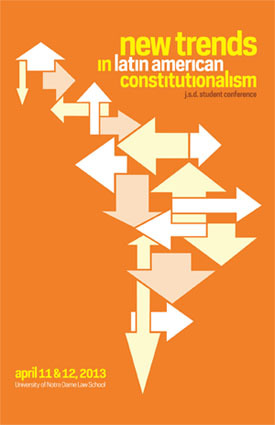
In Latin America, constitutional change happens frequently in order to meet the demands for the effective protection of human rights, and the consolidation of democracy and the rule of law. Nevertheless, opposing doctrines provide opposing answers to the main questions related to these general topics. This conference was designed to create the space for prominent scholars with divergent philosophical viewpoints to engage in creative dialogue around the pressing issues of Latin American constitutional structure.
The event was organized by the J.S.D. students in International Human Rights Law at the Notre Dame Law School, with the strong support of the Center for Civil and Human Rights, and the co-sponsorship of the Kellogg Institute and the Notre Dame Law School Program on Constitutional Structure.
Video of the opening session can be seen here.
Panel One: The Protection of the Individual Within the Context of a Community
The first panel will analyze the protection of indigenous peoples and minorities in constitutional law. The panelists will discuss the legitimacy of granting special protection to members of specific social groups. At a foundational level, the discussion will be focused on the possibility and feasibility of affirming the protection of communities within the current individualistic human rights discourse.
Panel Two: Equality: Exploring Indirect Discrimination
The second panel will analyze the content and reach of equality clauses. The panelists will discuss the role that the law and the state should play regarding the protection of individuals and groups against discrimination. At a foundational level, the panel will analyze whether equality clauses should only include protection against non-arbitrary discrimination, or whether it should also require the state to act positively in favor of marginalized groups.
Panel Three: Legal Pluralism in Human Rights
The third panel will analyze the notion of legal pluralism – the coexistence of different legal systems within one state. The panelists will explore how the constitutional recognition of indigenous law and the openness towards the incorporation of international law at a domestic level are leading to the creation of pluralistic legal systems. The panel will discuss the reasons for legal pluralist systems to exist and the reasons to require margins of discretion in order to be operational.